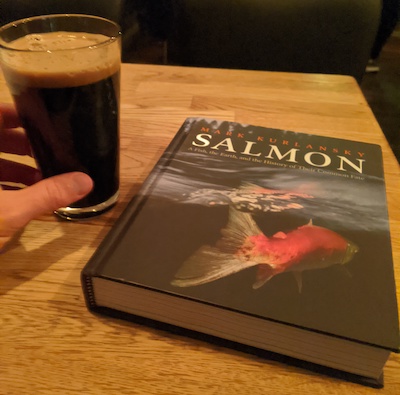Salmon |

|
25 September 2020
Mark Kurlansky's new book Salmon is first and foremost a political tome, as the subtitle reveals: A Fish, the Earth, and the History of Their Common Fate. The book details the long relationship between humans and salmon, how we successfully coexisted for millennia, and how the past few centuries have involved us eradicating them throughout most of their range. If salmon exist in the 22nd century it may only be in fish farms.
Most surprising for me was to learn that salmon were in all of the Atlantic river systems of Europe as well as in New England three centuries ago. Salmon was considered a typical New England dish at the time of the Revolution. There used to be huge spawning runs on the Connecticut. And the Rhine. And the Sacramento. Humanity killed them and then we forgot what had been done. I remember 16 years ago during another US election season when Kate sicked all her friends on me because I was voting for Bush and Brady had to switch email addresses in the group because we weren't talking about salmon restoration; I remember thinking how stupid it was to worry about some dumb fish when hydroelectric power was one of the most reliable and abundant energy sources available to humanity. Kurlansky's book has really made me rethink that opinion by putting in perspective the magnitude of habitat salmon have lost, because the trajectory toward extinction becomes so much clearer. If we cannot figure out how to live with animals, then we will lose them.
The world we see today may have been heavily modified by humans to the detriment and extinction of many of our cohabitants on this Earth, but Kurlansky presents a fairly one-sided perspective in his latest book. The expansion of humans into salmon habitat is consistently presented as a negative, although he oddly presents a number of salmon recipes in the texts. He also falls into the all too common fallacy that the Native Americans were balanced with their ecosystem before the Europeans came, when in fact they too had already been responsible for millennia of extinctions in the Americas.
Despite its shortcomings, I still recommend Salmon for its in depth discussion of salmon ecology across its historical range and for the book's detailed recounting of human eradication through much of that range.
